- Home
- Edith Wharton
The Hermit and the Wild Woman, and Other Stories Page 3
The Hermit and the Wild Woman, and Other Stories Read online
Page 3
Keep us, O Lord, as the apple of the eye, Protect us under the shadow of Thy wings.
The wound in her foot healed slowly; and the Hermit, while it was mending, repaired daily to her cave, reasoning with her in love and charity, and exhorting her to return to the cloister. But this she persistently refused to do; and fearing lest she attempt to fly before her foot was healed, and so expose herself to hunger and ill-usage, he promised not to betray her presence, or to take any measures toward restoring her to her Order.
He began indeed to doubt whether she had any calling to the life enclosed; yet her gentleness and innocency of mind made him feel that she might be won back to holy living, if only her freedom were assured. So after many inward struggles (since his promise forbade his taking counsel with any concerning her) he resolved to let her remain in the cave till some light should come to him. And one day, visiting her about the hour of Nones (for it became his pious habit to say the evening office with her), he found her engaged with a little goatherd, who in a sudden seizure had fallen from a rock above her cave, and lay senseless and full of blood at her feet. And the Hermit saw with wonder how skilfully she bound up his cuts and restored his senses, giving him to drink of a liquor she had distilled from the wild simples of the mountain; whereat the boy opened his eyes and praised God, as one restored by heaven. Now it was known that this lad was subject to possessions, and had more than once dropped lifeless while he heeded his flock; and the Hermit, knowing that only great saints or unclean necromancers can loosen devils, feared that the Wild Woman had exorcised the spirits by means of unholy spells. But she told him that the goatherd’s sickness was caused only by the heat of the sun, and that, such seizures being common in the hot countries whence she came, she had learned from a wise woman how to stay them by a decoction of the carduus benedictus, made in the third night of the waxing moon, but without the aid of magic.
“But,” she continued, “you need not fear my bringing scandal on your holy retreat, for by the arts of the same wise woman my own wound is well-nigh healed, and tonight at sunset I set forth on my travels.”
The Hermit’s heart grew heavy as she spoke, and it seemed to him that her own look was sorrowful. And suddenly his perplexities were lifted from him, and he saw what was God’s purpose with the Wild Woman.
“Why,” said he, “do you fly from this place, where you are safe from molestation, and can look to the saving of your soul? Is it that your feet weary for the road, and your spirits are heavy for lack of worldly discourse?”
She replied that she had no wish to travel, and felt no repugnance to solitude. “But,” said she, “I must go forth to beg my bread, since in this wilderness there is none but yourself to feed me; and moreover, when it is known that I have healed the goatherd, curious folk and scandal-mongers may seek me out, and, learning whence I come, drag me back to the cloister.”
Then the Hermit answered her and said: “In the early days, when the faith of Christ was first preached, there were holy women who fled to the desert and lived there in solitude, to the glory of God and the edification of their sex. If you are minded to embrace so austere a life, contenting you with such sustenance as the wilderness yields, and wearing out your days in prayer and vigil, it may be that you shall make amends for the great sin you have committed, and live and die in the peace of the Lord Jesus.”
He spoke thus, knowing that if she left him and returned to her roaming, hunger and fear might drive her to fresh sin; whereas in a life of penance and reclusion her eyes might be opened to her iniquity, and her soul snatched back from ruin.
He saw that his words moved her, and she seemed about to consent, and embrace a life of holiness; but suddenly she fell silent, and looked down on the valley at their feet.
“A stream flows in the glen below us,” she said. “Do you forbid me to bathe in it in the heat of summer?”
“It is not I that forbid you, my daughter, but the laws of God,” said the Hermit; “yet see how miraculously heaven protects you—for in the hot season, when your lust is upon you, our stream runs dry, and temptation will be removed from you. Moreover on these heights there is no excess of heat to madden the body, but always, before dawn and at the angelus, a cool breeze which refreshes it like water.”
And after thinking long on this, and again receiving his promise not to betray her, the Wild Woman agreed to embrace a life of reclusion; and the Hermit fell on his knees, worshipping God and rejoicing to think that, if he saved his sister from sin, his own term of probation would be shortened.
VI
THEREAFTER for two years the Hermit and the Wild Woman lived side by side, meeting together to pray on the great feast-days of the year, but on all other days dwelling apart, engaged in pious practices.
At first the Hermit, knowing the weakness of woman, and her little aptitude for the life apart, had feared that he might be disturbed by the nearness of his penitent; but she faithfully held to his commands, abstaining from all sight of him save on the Days of Obligation; and when they met, so modest and devout was her demeanour that she raised his soul to fresh fervency. And gradually it grew sweet to him to think that, near by though unseen, was one who performed the same tasks at the same hours; so that, whether he tended his garden, or recited his chaplet, or rose under the stars to repeat the midnight office, he had a companion in all his labours and devotions.
Meanwhile the report had spread abroad that a holy woman who cast out devils had made her dwelling in the Hermit’s cliff; and many sick persons from the valley sought her out, and went away restored by her. These poor pilgrims brought her oil and flour, and with her own hands she made a garden like the Hermit’s, and planted it with corn and lentils; but she would never take a trout from the brook, or receive the gift of a snared wild-fowl, for she said that in her vagrant life the wild creatures of the wood had befriended her, and as she had slept in peace among them, so now she would never suffer them to be molested.
In the third year came a plague, and death walked the cities, and many poor peasants fled to the hills to escape it. These the Hermit and his penitent faithfully tended, and so skilful were the Wild Woman’s ministrations that the report of them reached the town across the valley, and a deputation of burgesses came with rich offerings, and besought her to descend and comfort their sick. The Hermit, seeing her depart on so dangerous a mission, would have accompanied her, but she bade him remain and tend those who fled to the hills; and for many days his heart was consumed in prayer for her, and he feared lest every fugitive should bring him word of her death.
But at length she returned, wearied-out but whole, and covered with the blessings of the townsfolk; and thereafter her name for holiness spread as wide as the Hermit’s.
Seeing how constant she remained in her chosen life, and what advance she had made in the way of perfection, the Hermit now felt that it behoved him to exhort her again to return to the convent; and more than once he resolved to speak with her, but his heart hung back. At length he bethought him that by failing in this duty he imperilled his own soul, and thereupon, on the next feast-day, when they met, he reminded her that in spite of her good works she still lived in sin and excommunicate, and that, now she had once more tasted the sweets of godliness, it was her duty to confess her fault and give herself up to her superiors.
She heard him meekly, but when he had spoken she was silent and her tears ran over; and looking at her he wept also, and said no more. And they prayed together, and returned each to his cave.
It was not till late winter that the plague abated; and the spring and early summer following were heavy with rains and great heat. When the Hermit visited his penitent at the feast of Pentecost, she appeared to him so weak and wasted that, when they had recited the Veni, sancte spiritus, and the proper psalms, he taxed her with too great rigour of penitential practices; but she replied that her weakness was not due to an excess of discipline, but that she had brought back from her labours among the sick a heaviness of body which the intempe
rance of the season no doubt increased. The evil rains continued, falling chiefly at night, while by day the land reeked with heat and vapours; so that lassitude fell on the Hermit also, and he could hardly drag himself down to the spring whence he drew his drinking-water. Thus he fell into the habit of going down to the glen before cockcrow, after he had recited Matins; for at that hour the rain commonly ceased, and a faint air was stirring. Now because of the wet season the stream had not gone dry, and instead of replenishing his flagon slowly at the trickling spring, the Hermit went down to the waterside to fill it; and once, as he descended the steep slope of the glen, he heard the covert rustle, and saw the leaves stir as though something moved behind them. As he looked silence fell, and the leaves grew still; but his heart was shaken, for it seemed to him that what he had seen in the dusk had a human semblance, such as the wood-people wear. And he was loth to think that such unhallowed beings haunted the glen.
A few days passed, and again, descending to the stream, he saw a figure flit by him through the covert; and this time a deeper fear entered into him; but he put away the thought, and prayed fervently for all souls in temptation. And when he spoke with the Wild Woman again, on the feast of the Seven Maccabees, which falls on the first day of August, he was smitten with fear to see her wasted looks, and besought her to cease from labouring and let him minister to her in her weakness. But she denied him gently, and replied that all she asked of him was to keep her steadfastly in his prayers.
Before the feast of the Assumption the rains ceased, and the plague, which had begun to show itself, was stayed; but the ardency of the sun grew greater, and the Hermit’s cliff was a fiery furnace. Never had such heat been known in those regions; but the people did not murmur, for with the cessation of the rain their crops were saved and the pestilence banished; and these mercies they ascribed in great part to the prayers and macerations of the two holy anchorets. Therefore on the eve of the Assumption they sent a messenger to the Hermit, saying that at daylight on the morrow the townspeople and all the dwellers in the valley would come forth, led by their Bishop, who bore the Pope’s blessing to the two solitaries, and who was mindful to celebrate the Mass of the Assumption in the Hermit’s cave in the cliffside. At the blessed word the Hermit was well-nigh distraught with joy, for he felt this to be a sign from heaven that his prayers were heard, and that he had won the Wild Woman’s grace as well as his own. And all night he prayed that on the morrow she might confess her fault and receive the Sacrament with him.
Before dawn he recited the psalms of the proper nocturn; then he girded on his gown and sandals, and went forth to meet the Bishop in the valley.
As he went downward daylight stood on the mountains, and he thought he had never seen so fair a dawn. It filled the farthest heaven with brightness, and penetrated even to the woody crevices of the glen, as the grace of God had entered into the obscurest folds of his heart. The morning airs were hushed, and he heard only the sound of his own footfall, and the murmur of the stream which, though diminished, still poured a swift current between the rocks; but as he reached the bottom of the glen a sound of chanting came to him, and he knew that the pilgrims were at hand. His heart leapt up and his feet hastened forward; but at the streamside they were suddenly stayed, for in a pool where the water was still deep he saw the shining of a woman’s body—and on a stone hard by lay the Wild Woman’s gown and sandals.
Fear and rage possessed the Hermit’s heart, and he stood as one smitten speechless, covering his eyes from the shame. But the song of the approaching pilgrims swelled ever louder and nearer, and finding voice he cried to the Wild Woman to come forth and hide herself from the people.
She made no answer, but in the dusk he saw her limbs sway with the swaying of the water, and her eyes were turned to him as if in mockery. At the sight blind fury filled him, and clambering over the rocks to the pool’s edge he bent down and caught her by the shoulder. At that moment he could have strangled her with his hands, so abhorrent to him was the touch of her flesh; but as he cried out on her, heaping her with cruel names, he saw that her eyes returned his look without wavering; and suddenly it came to him that she was dead. Then through all his anger and fear a great pang smote him; for here was his work undone, and one he had loved in Christ laid low in her sin, in spite of all his labours.
One moment pity possessed him; the next he bethought him how the people would find him bending above the body of a naked woman, whom he had held up to them as holy, but whom they might now well take for the secret instrument of his undoing; and beholding how at her touch all the slow edifice of his holiness was demolished, and his soul in mortal jeopardy, he felt the earth reel round him and his sight grew red.
Already the head of the procession had entered the glen, and the stillness shook with the great sound of the Salve Regina. When the Hermit opened his eyes once more the air was quivering with thronged candle-flames, which glittered on the gold thread of priestly vestments, and on the blazing monstrance beneath its canopy; and close above him was bent the Bishop’s face.
The Hermit struggled to his knees.
“My Father in God,” he cried, “behold, for my sins I have been visited by a demon—” But as he spoke he perceived that those about him no longer heeded him, and that the Bishop and all his clergy had fallen on their knees about the pool. Then the Hermit, following their gaze, saw that the brown waters of the pool covered the Wild Woman’s limbs as with a garment, and that about her floating head a great light floated; and to the utmost edges of the throng a cry of praise went up, for many were there whom the Wild Woman had healed and comforted, and who read God’s mercy in this wonder. But fresh fear fell on the Hermit, for he had cursed a dying saint, and denounced her aloud to all the people; and this new anguish, coming so close upon the other, smote down his weakened frame, so that his limbs failed him and he sank once more to the ground.
Again the earth reeled about him, and the bending faces grew remote; but as he forced his weak voice once more to proclaim his sins he felt the blessed touch of absolution, and the holy oils of the last voyage laid on his lips and eyes. Peace returned to him then, and with it a great longing to look once more upon his lauds, as he had dreamed of doing at his last hour; but he was too far gone to make this longing known, and so tried to banish it from his mind. Yet in his weakness the wish held him, and the tears ran down his face.
Then, as he lay there, feeling the earth slip from under him, and the Everlasting Arms replace it, he heard a great peal of voices that seemed to come down from the sky and mingle with the singing of the throng; and the words of the chant were the words of his own lauds, so long hidden in the secret of his breast, and now rejoicing above him through the spheres. And his soul rose on the chant, and soared with it to the seat of mercy.
THE LAST ASSET
I
“THE devil!” Paul Garnett exclaimed as he re-read his note; and the dry old gentleman who was at the moment his only neighbour in the quiet restaurant they both frequented, remarked with a smile: “You don’t seem particularly annoyed at meeting him.”
Garnett returned the smile. “I don’t know why I apostrophized him, for he’s not in the least present—except inasmuch as he may prove to be at the bottom of anything unexpected.”
The old gentleman who, like Garnett, was an American, and spoke in the thin rarefied voice which seems best fitted to emit sententious truths, twisted his lean neck toward the younger man and cackled out shrewdly: “Ah, it’s generally a woman who is at the bottom of the unexpected. Not,” he added, leaning forward with deliberation to select a tooth-pick, “that that precludes the devil’s being there too.”
Garnett uttered the requisite laugh, and his neighbour, pushing back his plate, called out with a perfectly unbending American intonation: “Gassong! L’addition, silver play.”
His repast, as usual, had been a simple one, and he left only thirty centimes in the plate on which his account was presented; but the waiter, to whom he was evidently a famil
iar presence, received the tribute with Latin affability, and hovered helpfully about the table while the old gentleman cut and lighted his cigar.
“Yes,” the latter proceeded, revolving the cigar meditatively between his thin lips, “they’re generally both in the same hole, like the owl and the prairie-dog in the natural history books of my youth. I believe it was all a mistake about the owl and the prairie-dog, but it isn’t about the unexpected. The fact is, the unexpected is the devil—the sooner you find that out, the happier you’ll be.” He leaned back, tilting his smooth bald head against the blotched mirror behind him, and rambling on with gentle garrulity while Garnett attacked his omelet.
“Get your life down to routine—eliminate surprises. Arrange things so that, when you get up in the morning, you’ll know exactly what is going to happen to you during the day—and the next day and the next. I don’t say it’s funny—it ain’t. But it’s better than being hit on the head by a brick-bat. That’s why I always take my meals at this restaurant. I know just how much onion they put in things—if I went to the next place I shouldn’t. And I always take the same streets to come here—I’ve been doing it for ten years now. I know at which crossings to look out—I know what I’m going to see in the shop-windows. It saves a lot of wear and tear to know what’s coming. For a good many years I never did know, from one minute to another, and now I like to think that everything’s cut-and-dried, and nothing unexpected can jump out at me like a tramp from a ditch.”
He paused calmly to knock the ashes from his cigar, and Garnett said with a smile: “Doesn’t such a plan of life cut off nearly all the possibilities?”
The old gentleman made a contemptuous motion. “Possibilities of what? Of being multifariously miserable? There are lots of ways of being miserable, but there’s only one way of being comfortable, and that is to stop running round after happiness. If you make up your mind not to be happy there’s no reason why you shouldn’t have a fairly good time.”

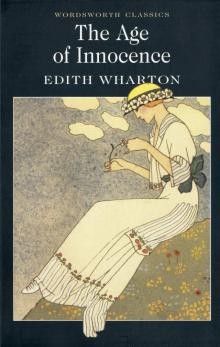 The Age of Innocence
The Age of Innocence The Reef
The Reef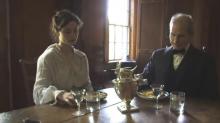 Summer
Summer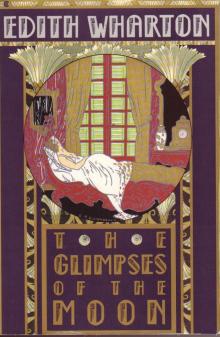 The Glimpses of the Moon
The Glimpses of the Moon Xingu
Xingu The Fruit of the Tree
The Fruit of the Tree Fast and Loose
Fast and Loose Artemis to Actaeon and Other Verse
Artemis to Actaeon and Other Verse The Line of Least Resistance
The Line of Least Resistance The Lamp of Psyche
The Lamp of Psyche The Reckoning
The Reckoning Afterward
Afterward The New York Stories of Edith Wharton
The New York Stories of Edith Wharton The 2014 Halloween Horrors Megapack
The 2014 Halloween Horrors Megapack 'Copy': A Dialogue
'Copy': A Dialogue The Recovery
The Recovery The Fulness of Life
The Fulness of Life Early Short Stories Vol. 1
Early Short Stories Vol. 1 Tales of Men and Ghosts
Tales of Men and Ghosts The House of the Dead Hand
The House of the Dead Hand That Good May Come
That Good May Come The Buccaneers
The Buccaneers Other Times, Other Manners
Other Times, Other Manners The Hermit and the Wild Woman
The Hermit and the Wild Woman Kerfol
Kerfol The Duchess at Prayer
The Duchess at Prayer Bunner Sisters
Bunner Sisters The Choice
The Choice Madame De Treymes
Madame De Treymes Ethan Frome, Summer, Bunner Sisters
Ethan Frome, Summer, Bunner Sisters In Morocco
In Morocco The Valley of Decision
The Valley of Decision Age of Innocence (Barnes & Noble Classics Series)
Age of Innocence (Barnes & Noble Classics Series) The Angel at the Grave
The Angel at the Grave April Showers
April Showers Sanctuary
Sanctuary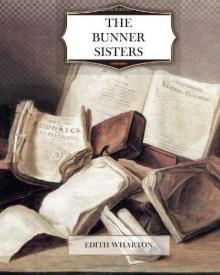 The Bunner Sisters
The Bunner Sisters Mrs. Manstey's View
Mrs. Manstey's View Writing a War Story
Writing a War Story The Custom of the Country
The Custom of the Country In Trust
In Trust The Triumph of the Night
The Triumph of the Night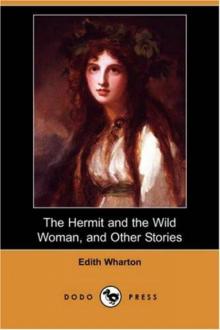 The Hermit and the Wild Woman, and Other Stories
The Hermit and the Wild Woman, and Other Stories Roman Fever and Other Stories
Roman Fever and Other Stories The Mission of Jane
The Mission of Jane The Descent of Man and Other Stories
The Descent of Man and Other Stories Coming Home
Coming Home The Touchstone
The Touchstone Early Short Stories Vol. 2
Early Short Stories Vol. 2 Edith Wharton's Verse, 1879-1919, from various journals.
Edith Wharton's Verse, 1879-1919, from various journals.